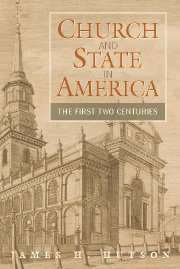4 - The Constitution and Beyond
Published online by Cambridge University Press: 05 June 2012
Summary
Neither the revolutionary state governments nor the Articles of Confederation gave Americans a stable, prosperous society. Consequently, a group of energetic, young leaders, responding to a demand (that they themselves had helped stimulate) for a new national government, convened in Philadelphia in May 1787 and in four months produced the federal Constitution, the summa of American statecraft.
Critics attacked the Constitution from all angles as soon as its text became public in mid-September. Believers accused the Framers of selling out the nation's faithful by showing “cold indifference towards religion.” To other distressed churchgoers it appeared that “in all probability the composers had no thought of God in all their consultations.” Some accused the Framers of recklessly repudiating America's covenant with God; “if civil rulers won't acknowledge God, he won't acknowledge them; and they must perish from the way.” These kinds of complaints continued to dog the Constitution. In 1789 Benjamin Rush informed John Adams that “many pious people wish the name of the Supreme Being had been introduced somewhere in the new Constitution.” A few years later, Timothy Dwight still could not conceal his unhappiness: “we found the Constitution without any acknowledgement of God; without any recognition of his mercies to us … or even of his existence. The Convention, by which it was formed, never asked, even once, his direction or his blessing upon their labours.”
- Type
- Chapter
- Information
- Church and State in AmericaThe First Two Centuries, pp. 139 - 188Publisher: Cambridge University PressPrint publication year: 2007



